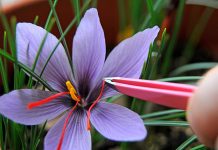In botany, plants are divided into families because they have similar characteristics. One of the well-known botanical families is the Solanaceae, which includes tomatoes, peppers, eggplants, potatoes, tobacco, and others.
One of the characteristics they have in common is that they all possess the solanine alkaloid. It is a substance that helps plants to protect themselves from possible diseases, attacks, or pests. This alkaloid is present in greater concentration in the leaves and stem of these plants and decreases its presence in the fruit as it matures.
Solanine is a substance that has toxic effects on the human body. It is known that, in high doses, it can generate headaches, nausea, vomiting, abdominal pain, diarrhea, fatigue, and even that it can be irritating for people with arthritis.
In the macrobiotic diet, Solanaceae are excluded from the diet. “Solanaceous foods may subtly extract calcium from bones and deposit it in joints, kidneys, arteries and other areas of the body where it is not supposed to be,” explains Norman F. Childers in his book A Diet to Stop Arthritis: The Nightshades and Ill Health.

Also read: How to Germinate Coriander Without Seed?
What is recommended
Tomatoes: harvest from the plant and eat the fruits when they are ripe.
Potatoes: do not leave them in the sun, as this increases the production of solanine. If they are green, it is an indication of the high content of this alkaloid, so avoid eating them. At the same time, avoid eating them when they are sprouted because they have the same characteristic.
Bell pepper and eggplant: avoid eating the seeds raw, cooked they lose much of the solanine.
In the case of making compost with worms, it is important to know that the solanine present in the leaves is also toxic to the worms. The leaves can be left in the sun or cooked to reduce their toxic effect, or they can be added to traditional compost.
Although plants should be our medicine, they have powerful substances that, if not well administered, can be dangerous. It is essential to inform ourselves and make conscious and responsible decisions regarding the use of plants for our health.
Translated and adapted by Noobuzz staff.
Sources: Bioguia







